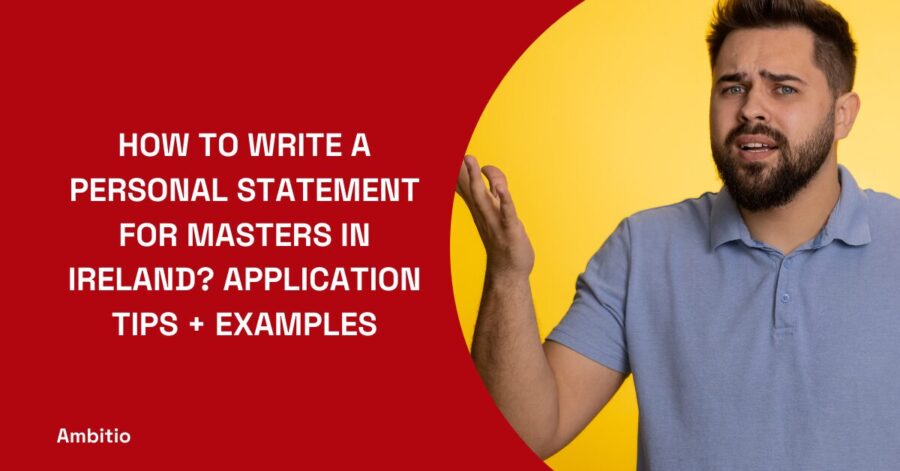16 April 2025
5 minutes read
How To Write A Personal Statement For Masters In Ireland? Application Tips + Examples

Key Takeaways
- Write a personal statement for Masters in Ireland with purpose, relevance, and zero fluff to stand out in a competitive application pool
- Focus on motivation, academic foundation, and real experience that aligns directly with the course and university
- Customize your SOP for each institution and eliminate common mistakes like vague intros, clichés, or careless grammar
You only get one personal statement—and it decides whether your application moves forward or gets ignored. No second chances.
Most students treat it like another document. Big mistake. Irish universities want more than just academic stats and vague passion. They want motivation, relevant work experience, and clear insight into why you fit the course or programme. One spelling slip, a missed section, or weak methodology? That’s all it takes to fail.
This guide breaks it down—how to apply with a statement that hits every requirement, avoids errors, and actually demonstrates why you deserve a spot. No fluff. Just real tips to help you highlight your achievements, research, and foundation—then submit something worth reading.
What Are The Key Elements In Personal Statement?
What even is a personal statement? A motivational speech? A mini-biography? A subtle cry for help at 2 AM before the deadline? Let’s be real—no one teaches you how to write one properly. You just Google it, stare at a blank doc, and wonder how to cram your entire study history, internships, and soul into 500 words without sounding desperate.

In my opinion, if you want to stand out as a graduate applicant, you need structure, clarity, and zero grammatical errors. A strong foundation—not fluff. Below are the key elements your personal statement must include if you want real results.
1. Your Academic Foundation
Start by explaining your study background—what you’ve studied, where, and why it matters. This builds the foundation of your story and shows the university how your academic path connects to the course you’re applying for. Keep it sharp and focused. No one cares about your favorite subject in high school—unless it directly shaped your goals.
2. Real Motivation (Not the Fake Kind)
Universities don’t want generic love letters. They want to see why you’re genuinely interested in the programme—and how it fits into your long-term plan. Mention what inspired you to apply, how this specific course lines up with your career direction, and what keeps you curious. And no, saying “I’ve always wanted this” isn’t enough.
3. Relevant Experience & Internships
This is where you back up your story with real work. Talk about any internship, job, or volunteer experience that adds value. Be specific about what you learned, what you contributed, and how it relates to the course. Even a part-time role can become powerful if it connects to your field and demonstrates commitment.
4. Skills That Actually Contribute
Don’t just list skills—demonstrate them. Show how your strengths (research, teamwork, time management) can contribute to the classroom and beyond. Make it clear that you’re not just here to take notes. You’re here to bring something to the table and raise the standard. Confidence, not arrogance.
5. Feedback That Shaped You
No one’s perfect, and universities know that. Sharing how you took feedback, applied it, and improved shows emotional intelligence and resilience. Whether it was a professor’s critique, a tough internship review, or a failed project—use it. Growth stories are often more powerful than polished ones.
6. Proofread Like Your Life Depends On It
Seriously. One spelling slip or a few grammatical errors can tank everything. Proofread it yourself, then get a second opinion. Use tools, ask a mentor, or even consult a professional. Treat your personal statement like a pitch, not a draft. Submitting it full of errors? That’s not brave. That’s careless.
6 Expert Tips For Writing SOP For Top Universities In Ireland
You’ve got 1000 words to sell your entire existence. Your dreams, your academic background, your professional experience, your aspiration to study abroad—all squeezed into a formal document detailing why you’re the ideal candidate. Sounds ridiculous, right? That’s because it is.

Here are 6 tips that eliminate the fluff and help you write a personal statement (or statement of purpose) that actually compels them to say yes.
1. Nail the Introduction: No Clichés, No Fluff
Start strong. The introduction sets the tone, and if you open with “I have always wanted to pursue…”—you’ve already lost them. Avoid overused templates and instead start with a sharp insight, a pivotal moment, or a unique angle that connects directly to the programme you are applying for. Make it clear why this particular course at this specific university makes sense for you.
2. Showcase Academic Background Without Sounding Robotic
This isn’t a repeat of your academic transcripts. Focus on your academic performance and achievements that are relevant to the university and course. Mention awards, undergraduate projects, or areas where you showed intellectual curiosity or innovation. Keep it concise, precise, and packed with relevant information.
3. Connect Professional Experience to Career Goals
Talk about your professional background or employment in a way that clearly links to your short-term and long-term career goals. This helps the committee see how your past connects with your future and proves your intention isn’t vague. Whether it’s an internship or a full-time job, focus on how it shaped your decision to pursue this programme.
4. Personalize for Different Universities
One SOP does not fit all. Every institution has specific requirements. Customize your statement of purpose to show why you’re choosing that specific university, how it aligns with your goals, and what unique contribution you bring to their classroom. Mention faculty, resources, or elements of the course that excite you. Writing your SOP like a mass email? That’s a red flag.
5. Include Relevant Extracurriculars and Traits
You’re not just an applicant—you’re a human being. Don’t shy away from highlighting extracurricular activities that align with your goals or reflect leadership, creativity, or initiative. A good personal statement balances academics with personality. The goal? Convince them you’ll contribute to the campus beyond just grades.
6. Keep It Clean: Word Limit, Tone & Structure
Respect the word limit (usually around 1000 words). Stay concise, eliminate repetition, and avoid overly complex verbs. Your tone should be formal but natural—like you’re speaking to a respected professional. And proofread. Twice. One of the most common mistakes is sending a document full of awkward phrasing or sloppy grammar. Don’t be that person.
10 Top Universities To Apply In Ireland For Masters
Ask yourself this—are you applying to a university just because it sounds good, or because it’s actually a smart investment for your future?
When you’re studying in Ireland, the name of the institution matters—but so do the numbers. Tuition fees, graduate salaries, and the quality of the programme you are applying to all play a role. To make your application process easier, here’s a snapshot of the top 10 universities in Ireland for Masters, what they cost, and what you can expect after graduation.
| University | Average Tuition Fees (Per Year) | Average Graduate Salary (Per Year) |
|---|---|---|
| Trinity College Dublin | €18,000 – €24,000 | €42,000 – €55,000 |
| University College Dublin (UCD) | €17,000 – €25,000 | €40,000 – €52,000 |
| National University of Ireland, Galway (NUIG) | €14,000 – €18,000 | €35,000 – €47,000 |
| University College Cork (UCC) | €14,000 – €20,000 | €36,000 – €48,000 |
| Dublin City University (DCU) | €13,000 – €17,000 | €34,000 – €45,000 |
| Maynooth University | €12,000 – €16,000 | €32,000 – €44,000 |
| University of Limerick (UL) | €13,000 – €18,000 | €33,000 – €46,000 |
| Technological University Dublin (TUD) | €11,000 – €15,000 | €32,000 – €42,000 |
| Munster Technological University (MTU) | €10,000 – €14,000 | €30,000 – €40,000 |
| South East Technological University (SETU) | €10,000 – €13,000 | €28,000 – €38,000 |
Conclusion
Most applicants overthink it or underdeliver. Don’t do either. Think of your statement as your pitch to a room full of people who don’t know you—but could change your future. Say something real. Make it count. And always—always—proofread.
If you’re serious about studying in Ireland, get serious about how you present yourself. Your story already has value. The goal is to make sure the committee gets it in 1000 words or less.
Personal statement is just one part of the equation—your entire profile tells the real story. At Ambitio, our AI-powered study abroad experts help you build a standout application that goes beyond grades. No generic templates, no guesswork—just a strategy that proves you’re the right fit.

You can study at top universities worldwide!
Get expert tips and tricks to get into top universities with a free expert session.
Book Your Free 30-Minute Session Now! Book a call now




























